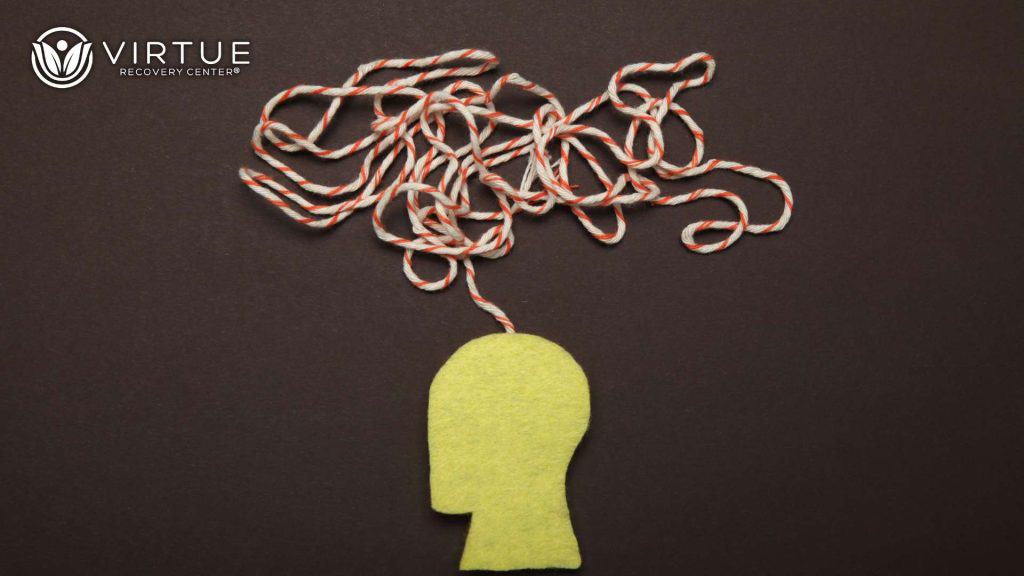Key Takeaways
-
K2 and Spice are synthetic drugs made to mimic cannabis but can be much more dangerous.
-
These products often contain unknown chemicals that can cause severe physical and mental health problems.
-
Despite being marketed as “legal” or “natural,” K2 is unpredictable, addictive, and harmful.
-
Virtue Recovery Chandler provides treatment options for people struggling with synthetic cannabinoid addiction.
Introduction
It might look like marijuana. It might even smell like it.
But K2—also known as Spice—is not natural cannabis. It’s a synthetic drug made in labs, sprayed on plant material, and sold under names like “herbal incense” or “fake weed.”
It’s often sold in shiny packets at gas stations or online. Some people believe it’s safe or legal. But that couldn’t be further from the truth.
K2 is unpredictable. It’s dangerous. And it can lead to serious health issues or even death.
If you or someone you love is using K2, here’s what you need to know—and how to get help.
What Is K2 or Spice? Understanding Synthetic Cannabinoids
K2 and Spice are part of a group of drugs called synthetic cannabinoids. They’re made by spraying man-made chemicals onto dried plant matter to look like marijuana. These chemicals are designed to act like THC, the psychoactive part of cannabis.
But they are not the same.
Synthetic cannabinoids bind much more strongly to cannabinoid receptors in the brain, often producing stronger and more dangerous effects than THC. And because the formulas keep changing, you never really know what’s in the packet.
These products are sold under names like:
-
K2
-
Spice
-
Black Mamba
-
Genie
-
Scooby Snax
-
Spice Gold
They’re often labeled “not for human consumption” to avoid legal trouble, but that’s exactly how people use them—by smoking, vaping, or brewing them in tea.
How Do Synthetic Cannabinoids Affect the Brain?
The brain has cannabinoid receptors, which help control mood, memory, and movement. Natural cannabis interacts with these gently. But synthetic cannabinoids overpower them.
This leads to intense effects, including:
-
Severe confusion
-
Hallucinations (seeing or hearing things that aren’t there)
-
Paranoia
-
Violent outbursts or panic attacks
And because the chemicals are always changing, each experience can be different—even dangerous.
Some users feel a high like marijuana. Others feel terrified, disconnected from reality, or unable to control their bodies.
Short-Term Health Risks of K2/Spice Use
The side effects of K2 can begin within minutes of smoking and may last for hours. Some of the short-term risks include:
-
Rapid heart rate
-
Nausea and vomiting
-
Agitation or aggressive behavior
-
Seizures
-
Hallucinations and psychotic episodes
-
Suicidal thoughts
Many people have ended up in emergency rooms after using K2. In some cases, users have collapsed, stopped breathing, or died. What makes it even scarier? These reactions can happen the first time you try it.
Long-Term Effects and Dangers of Synthetic Cannabinoid Use
Using synthetic marijuana regularly is dangerous. Over time, it can lead to:
-
Long-lasting mental health problems, including anxiety, depression, or psychosis
-
Memory loss and trouble concentrating
-
Heart problems or high blood pressure
-
Increased risk of stroke or other serious conditions
Because the drug is so strong and unpredictable, users may not realize how deeply it’s affecting them until they try to stop—or until it’s too late.
Why Is K2 Still Being Used Despite the Dangers?
Some people use K2 because they think it’s safe. Others think it’s legal. Some use it to avoid detection on standard drug tests, since certain types of synthetic cannabinoids weren’t always tested for.
But those ideas are dangerous myths.
Here’s the truth:
-
Many synthetic cannabinoids are now illegal in Arizona and across the U.S.
-
New versions are constantly being made to skirt the law
-
Even if a version is legal, that doesn’t mean it’s safe
-
Some users don’t realize it’s not marijuana until it’s too late
K2 is cheap, easy to find, and sold in colorful packaging. But none of that makes it safe.
Recognizing Signs of Synthetic Cannabinoid Abuse
If someone is using K2, they may show physical, mental, or emotional changes. Here are some warning signs:
Physical signs:
-
Red or glassy eyes
-
Nausea or vomiting
-
Irregular heartbeat
-
Trouble breathing
Behavioral signs:
-
Acting paranoid or aggressive
-
Confused or disoriented speech
-
Sudden mood swings
-
Isolating from family and friends
Psychological signs:
-
Hallucinations or psychotic behavior
-
Memory problems
If you notice these signs, don’t wait. K2 use can escalate quickly and lead to dangerous outcomes.
Treatment Options for K2/Spice Addiction
Addiction to synthetic cannabinoids can be treated—but it requires professional help.
At Virtue Recovery Chandler, we offer personalized care for people struggling with synthetic drug abuse. Our programs include:
-
Medical detox to safely clear harmful substances from the body
-
Inpatient rehab for those needing a safe, supportive place to heal
-
Outpatient treatment for those who need flexibility
-
Individual and group therapy to understand the root causes of use
-
Mental health support, especially for those experiencing anxiety, depression, or trauma
-
Relapse prevention plans and long-term care strategies
You don’t have to go through this alone. We’ll walk with you every step of the way—toward healing and hope.
Conclusion: K2 Isn’t “Fake Weed”—It’s a Real Danger
K2, Spice, and other synthetic cannabinoids are not harmless herbs. They’re powerful, lab-made drugs that can hijack your brain and hurt your body.
If you or someone you love is using K2, it’s time to take it seriously.
Help is here.
Call Virtue Recovery Chandler today at 866-338-5779 to talk with a treatment specialist and take the first step toward recovery. We’re here to help—any time, day or night.
FAQs About Smoking Synthetic Cannabinoid Products and Addiction Treatment
What are synthetic cannabinoids and how do they relate to K2 (Spice)?
Synthetic cannabinoids, often referred to as K2 or Spice, are a class of designer drugs that mimic the effects of cannabis. They are man-made chemicals that bind to the same cannabinoid receptors in the brain as THC, the active component of the cannabis plant.
What are the health effects associated with taking synthetic cannabinoids?
The health effects of taking synthetic cannabinoids can vary widely and may include severe anxiety, paranoia, hallucinations, and even seizures. These psychoactive substances can also lead to adverse effects such as increased heart rate and vomiting, which are not typically associated with natural cannabis use.
Are products containing synthetic cannabinoids legal?
While some products containing synthetic cannabinoids may have been legal in the past, many have since been classified as controlled substances by the Drug Enforcement Administration due to their potential for abuse and harmful health effects. Always check local laws regarding synthetic cannabinoid use.
How do synthetic cannabinoids differ from natural cannabis?
Unlike natural cannabis, which contains a variety of cannabinoids and terpenes that contribute to its effects, synthetic cannabinoids are chemically engineered to enhance potency and can have unpredictable effects. This difference can lead to more severe health risks when taking synthetic cannabinoids.
How are synthetic cannabinoids typically consumed?
Synthetic cannabinoids are commonly consumed by inhaling them after being sprayed on herbal material, which is then smoked. They can also be found in other forms, such as oils or edibles, but inhalation remains the most common method of use among cannabis users.
What role does the Food and Drug Administration play in regulating synthetic cannabinoids?
The Food and Drug Administration (FDA) has been involved in regulating synthetic cannabinoids by issuing warnings and guidelines regarding their use and safety. The FDA monitors products containing synthetic cannabinoids and can take action to prevent their sale if they pose significant public health risks.
What are the potential risks of using synthetic cannabinoids for substance use?
The potential risks of using synthetic cannabinoids include addiction, withdrawal symptoms, and a variety of adverse effects that can be more severe than those associated with cannabis. Users may not be aware of the specific chemicals contained in these products, leading to unpredictable health outcomes.
Can synthetic cannabinoids be detected through drug testing?
Yes, synthetic cannabinoids can be detected through drug testing; however, standard drug tests may not always identify these substances. Advanced methods, such as mass spectrometry, can be used to specifically test for synthetic cannabinoids and their metabolites.
What should someone do if they experience adverse effects from taking synthetic cannabinoids?
If someone experiences adverse effects from taking synthetic cannabinoids, it is important to seek medical attention immediately. The Department of Health recommends contacting a healthcare professional or going to the emergency room for severe reactions.
Resources
https://www.dea.gov/factsheets/spice-k2-synthetic-marijuana







